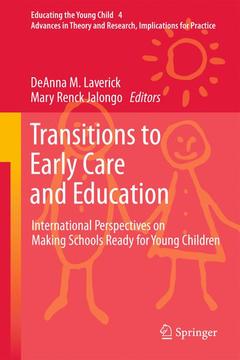Description
Transitions to Early Care and Education, 2011
International Perspectives on Making Schools Ready for Young Children
Educating the Young Child Series, Vol. 4
Coordinators: Laverick DeAnna M., Renck Jalongo Mary
Language: English
Subjects for Transitions to Early Care and Education:
Keywords
Canada; Caribbean; China; Chinese children; Functional Behavior Analysis (FBA); Italy; Mexico; United States; autism spectrum disorders (ASDs); childhood educators; children's needs; early childhood education; elementary school; formal school; infants; international perspectives; kindergarten; parental involvement; practice; school environment
Publication date: 04-2013
204 p. · 15.5x23.5 cm · Paperback
Publication date: 03-2011
204 p. · 15.5x23.5 cm · Hardback
Description
/li>Contents
/li>Comment
/li>
Transitions to new educational experiences are a universal rite of passage encountered by children worldwide. This volume in the Educating the Young Child: Advances in Theory and Research, Implications for Practice series provides early childhood educators with a resource that focuses on the transitions that young children make to early care and education settings, along with the issues that surround this important time in their lives. New experiences, such as the start of formal schooling, mark important and exciting events that also evoke different reactions from children and their families. The diverse experiences, traits, and needs exhibited by young children provide early childhood educators with what may be a potentially challenging role. With an international focus, the purpose of Transitions to Early Care and Education: International Perspectives on Making Schools Ready for Young Children is to communicate an enlarged view of the transition process in order to appreciate and honor the promise and potential of all children worldwide. Contributing to this volume are a group of distinguished researchers, practitioners, and educators in the field of early childhood education. Their collective expertise is shared with those who are committed to educating and caring for young children and the families they serve.
Foreword; Mary Renck Jalongo.- Introduction; DeAnna M. Laverick.- Part One - Programs and Practices.- 1. Transitions to Group Care for Infants, Toddlers and Families; Nancy Balaban.- 2. Examining the State of the Science: Empirical Support for Kindergarten Transition Practices for Students with Disabilities; Laura Lee McIntyre and Leah K. Wildenger.- 3. Supporting and Sustaining Transition to Formal Schooling for Children on the Autism Spectrum; Joann M. Migyanka.- 4. Early Literacy: Connections and Disconnections Between Oral Language and Literacy; Susan Hill.- 5. Teacher Outreach to Families Across the Transition to School: An Examination of Teachers’ Practices and their Unique Contributions to Children’s Early Academic Outcomes; Annemarie H. Hindman, Lori E. Skibbe, and Frederick J. Morrison.- Part Two -Policies and Issues.- 6. Critical Perspectives on Transition to School: Reframing the Debate; Anne Petriwskyj and Susan Grieshaber.- 7. Transition in the Classroom: The Teacher; Margaret King.- 8. Preparing Preschoolers for Kindergarten: A Look at Teacher Beliefs; Sandraluz Lara-Cinisomo, Allison Sidle Fuligni, and Lynn A. Karoly.- 9. The School Readiness of Preschoolers from Urban Backgrounds; Regena F. Nelson.- 10. Culture, Health, and School Readiness: An Integrated Approach to Transition; Suzanne M. Winter.- Part Three - International Perspectives.- 11. Reconsidering Readiness: Should the Spotlight be on Children or on Schools?; Nancy K. Freeman and Beth Powers-Costello.- 12. Preparing Young Children for Schools in China: Critical Transitions for Chinese Children; Yaoying Xu.- 13. The Socio-Cultural Contexts of Early Education in Caribbean Societies: A Focus on Transition to Primary School; Jaipaul Roopnarine and James E. Johnson.-14. Transition to School: Child, Family, and Community-Level Determinants; Magdalena Janus.- 15. Schools as Integrated Hubs for Young Children and Families; Tomoko Arimura, Carl Corter, Janette Pelletier, Zeenat Janmohamed, Sejal Patel, Palmina Ioannone and Saba Mir.- Index.




